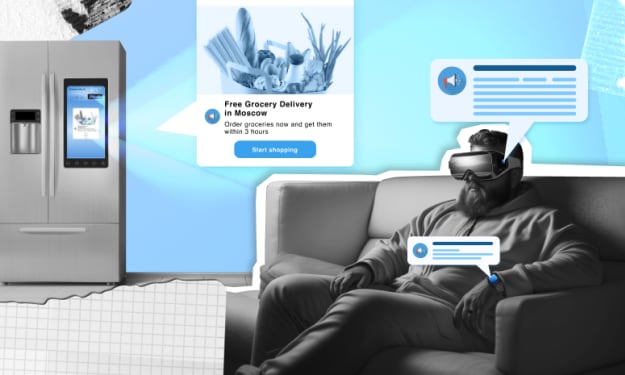Identity Theft
What To Do When Your Identity Has Been Compromised

Over two weeks ago, I experienced the worst thing that could happen to me. Someone stole my identity. To know that your identity has been stolen leaves you fearful of the unknown. It makes you wonder how many times your personal information has circled to different hackers. I've never been this stressed and afraid in my life. One emotion that I can't get over is the anger and disappointment I have towards myself. I remember I kept telling myself, "You knew better," and, "How could I be so stupid?" A few weeks have passed, and my negative self-talk has subsided. I was a victim of a phishing email scam.
Before I begin, I think it is vital for you, the reader, to get a better understanding of what email phishing is. According to the IRS, email phishing is a "scam typically carried out through unsolicited email or websites that pose as legitimate sites and lure unsuspecting victims into providing personal and financial information." In my case, this criminal was pretending to be a representative of PayPal. Below is the actual email that I received.
Fake PayPal Email

Example of the email that I received. Alert A: It was not an official PayPal email address. Alert B: TM should not be added after the Pal in PayPal. Alert C: The greeting should list your name and not "customer." Alert D: The font and layout was just terrible
Real PayPal Email

As you can see the email address alone is a good indicator that it's from PayPal. Every email should greet you with your first and last name. The logo is also a good indicator that the email is safe. The fake email above doesn't display the logo anywhere.
The first mistake that I made was I didn't read the email thoroughly. I glanced, and it said security, and that's when I started to panic. The second mistake I made was my mind was already preoccupied doing something else. That notification bar can give you FOMO (fear of missing out) symptoms, so it feels relaxing to slide down that notification bar and answer any text or email. I currently work in the medical field, and I, out of all people, should know the importance of protecting one's personal information. The IT department does an excellent job of sending monthly emails on what to look out for and to educate us about the different ways one can steal your identity. With such a terrible personal experience comes many lessons. I compiled a list of tips and tricks on what to do if you become a victim of identity theft.
Call Your Bank
You will be notified by your bank immediately if they detect fraudulent activity. Once I received that notification, I called my bank. I quickly explained to the rep about the scenario. I told what information I gave and in the form in which I gave it. In this case, it was an email. The customer service rep was diligent in making sure my old account got deleted and obtained a new account. That took a total of 30 minutes or so to swap the information over. I also had to go inside the bank and pick up a new debit card.
Look over your credit report
It may seem like an afterthought, but obtain a copy of your credit report. Luckily, I have an account through Credit Karma. It was easy and convenient to look over my information thoroughly. I went into the FAQ section of the site to locate what to do if you've possibly been a victim of identity theft. I froze my credit report through the three credit bureaus: Experian, Transunion, and Equifax. Those are accessible online services. Note: If you did not receive a PIN or create a PIN, then you did not freeze your accounts. That means nobody is allowed to run your credit without your permission. Credit Karma alerts you if your online activity has been a part of any breaches. If so, they will list all of the passwords that you should stop using immediately. People tend to reuse a password on different platforms, and that could be dangerous. It's best to change them.
Use Your Place of Employment to Your Advantage
If your place of employment has EAP (employee assistance program) benefits, use them. They can give you the resources you need to get the protection you need. I got in contact with a Fraud Resolution Specialist, and he was so lovely and very informative. He forwarded all the recommended documents I needed.
Fill out the IRS Affidavit 14039 Form
If you think that any information you gave will be used to use your identity, alert the IRS immediately. That form is your golden ticket in making sure your finances and tax information is protected.
Call The DMV
Some hackers will try to get a change of address form from the DMV. Once you get in contact with a rep, explain how your address could be a part of an identity theft scheme. They then will put a 30 day courtesy control stop on your record, which will limit access to your file. If you want to extend that limited access to a year, then you must provide a written statement encouraging them to do so.
Contact Your Bank Again
You can never be too sure on your protection. Ask a different representative on other alternatives to protect your account. One thing that my bank offers is a passcode, which means that I get to create a "secret passcode" to access anything in my account. You cannot deposit, withdraw, open up a new account, or apply for a loan without giving that password. Note: If you notice any suspicious transactions, you can revoke that vendor from charging anything on your account.
Contact Your Social Security Office
They will also put an alert on your social security number to make sure you are once again protected. Annually, the social security office sends you updated information about retiring and how much money you would obtain a month from the social security office when you decide to retire. If you notice a glitch in your finances or the approximate number, please contact them.
Technology has become a part of everyone's daily routine. It's fast and convenient. You can call your mom, text your dad, pay a bill, and make a purchase on Amazon all at the same time. Humans, at times, become forgetful or careless when it comes to online purchases and creating accounts with passwords that say "password." I would encourage you not to be lazy, carry cash, and close all online accounts if any other online accounts that you don't use can obtain useful information about you. My anxiety has gone down a ton, but I still worry that someone can be out there pretending to be me. Educate yourself, educate others, read the fine print, and stay safe.
If you enjoy my stories, leave me a tip, or even share my work on social media! Any support is appreciated.






Comments
There are no comments for this story
Be the first to respond and start the conversation.